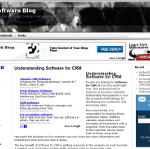Frank Dazerton
Customer Relationship Management (abbreviated CRM) is a very hot topic among businesses. CRM is such a hot topic because it is a way for businesses to connect with their customers, increase profits, and have better customer service. There are several things that you need to know about CRM.
1. It’s all about the customer. Some companies focus too much on expensive CRM programs and elaborate IT departments and not enough on what is at the core of CRM. CRM programs need to be designed to appeal to the business’ customers. The best Call Centers are the ones which customers find easy to navigate. The best CRM vendors have the customer satisfaction in mind when designing their CRM applications.
2. On-demand is the way to go. Many vendors offer traditional CRM programs and service. I believe, however, that On-demand CRM is the way to go. On-demand CRM is different from traditional methods in that instead of requiring companies to hire new IT people, and use extensive resources to implement elaborate CRM programs, the software comes with support. On-demand CRM is no longer the “bring your own IT department†approach. Many vendors like Salesforce.com, Siebel, and NetSuite offer On-demand solutions that are great for businesses just getting into the CRM market.
3. Customer Relationship Management is not just software. Some businesses would like it to be simply software, but it will never be as simple as that. Customer Relationship Management is an ongoing learning process. The business must learn from the customer and change accordingly. The closer a business gets to its customer, the better. CRM applications and strategies are the methods through which the business can access, analyze, and learn from customer Data. Knowing what CRM applications are actually for is a very important step in understanding how to be successful when implementing CRM practices.
4. It is important to understand that there are hundreds of CRM vendors out there. Many of the vendors claim to be number one, but if you look closely, they may be number one in only one category. Other companies say that they are number one in CRM, but there is no basis for their statement. It is important for companies to choose the right vendor that will attend to all of their CRM needs. This may not always be the most expensive, “number one†company. On the contrary, some simple companies offer CRM solutions that are highly effective. Some of the major CRM providers are Siebel, Salesforce.com, NetSuite, IBM, Microsoft, and SAP.
5. The best CRM technology can be very helpful for any business. Some CRM applications can now be accessed via BlackBerry devices. Major vendors are constantly updating their software and improving their service. It is a good idea to stay as current as possible in terms of CRM technology. However, always remember to balance technology with customer service. There is no substitute for old-fashioned customer service, the most basic of all CRM ideals.
Customer Relationship Management can be very beneficial for a business if it is carried out properly. It is important to keep the customer in mind at all times when you are implementing CRM practices into your business. Remember that there are quite a few CRM vendors out there, and it is important to choose the vendor that is best for your company. Customer Relationship Management seems like a very daunting idea for someone who has never used it before, but if you follow these steps, you will surely see the benefits of successful CRM.
Frank Dazerton enjoys writing about a variety of Custromer Relationship Management topics. In addition to writing CRM articles, he writes for CRM Lowdown ( www.crmlowdown.com ).
Provided by ArticleFeeder.com
